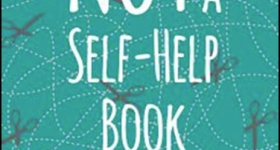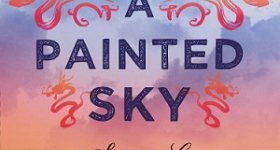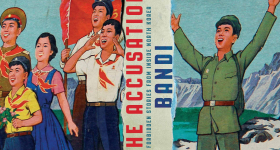Phuc Tran’s Sigh, Gone: A Misfit’s Memoir of Great Books, Punk Rock, and the Fight to Fit In was released by Flatiron Books on April 21, 2020, amid the pandemic and just days before the 45th anniversary of Fall of Saigon — the city alluded to in the title’s wordplay. A high school Latin teacher and renowned tattoo artist with his own shop, Tran spins a tale of being the Vietnamese immigrant kid in the white American town of Carlisle, Pennsylvania in the 1980s. The book traces the life of a 4-year-old Phuc figuring out what his name should be in English (“Fook,” his dad decides) to the times he must confront the reality of abuse and PTSD in his Vietnamese family. Tran packs Sigh, Gone with episodes from his boyhood innocence and obsession with Star Wars; candid observations of his family’s differences; the spirit of teenage rebellion imbued in punk culture and skater boy antics; his loss of virginity; and his gradual appreciation for the classics, all the way up to his high school graduation.
Tran’s account of a Vietnamese American misfit’s encounter with the power of books and punk rock brings to mind Gurinder Chadha’s 2017 film Blinded by the Light, where a British-Pakistani Muslim teenager, with his love for Bruce Springsteen and writing, confronts the anti-Muslim racism in his community. The movie is based on journalist Sarfraz Manzoor’s memoir, Greetings from Bury Park: Race. Religion. Rock 'n' Roll. The memoir is also reminiscent of Junot Díaz’s The Brief Wondrous Life of Oscar Wao — a refreshing take on the Dominican American experience covering hybridity, diaspora, intergenerational trauma, a ‘fuku’ curse. I anticipated Sigh, Gone to blend Blinded by the Light’s coming-of-age through quintessential American culture and Oscar Wao’s irreverently humorous tone — but rooted in the Vietnamese American experience.
Sigh, Gone was not the perfectly sarcastic and humorous tale that I expected — that book is still waiting to be written to complete the catalog of Vietnamese American literature. Still, Tran’s memoir boldly held a Vietnamese boy’s story against an English canon, which no Vietnamese American author had done before. And he kept his stories casual and tangible rather than trying to deliver a complicated, abstract message about assimilation in America. He offers another valid experience of being Vietnamese in America without actually dedicating many pages to wartime trauma or what inheriting the Vietnam War means, as do the personal essays or semi-autobiographical novels of Andrew Lam, le thi diem thuy or Ocean Vuong. Phuc’s conversational style and tone might handle the themes of his experiences with less gravitas, but his directness ultimately allows him to deliver the harsh truths of being an outsider in a way that’s hard to water down.
Tran weaves his Vietnamese coming-of-age story into the all-American backdrop of punk rock and great literature, but the backdrop remains just that in the overall story — an eye-catching but superficial introduction into Phuc’s world. Tran lays out how he became interested in punk and the classics in the prologue, but it is not until Chapter 7 (of the memoir’s 11 chapters) that 8th-grader Phuc picks up a skateboard, and not until 11th grade that Phuc discovers his love for books. The memoir ends with Phuc’s high school graduation, so it’s unclear how or whether he changes in college, or how he came to be a Latin teacher and famous tattoo artist. While the narration is funny and sarcastic, it includes little of the older Phuc’s wisdom that is perceptible when he reflects on his life. Because the younger Phuc is narrating and experiencing each scene for the first time, the voice and outlook of the memoir remain rather boyish throughout.
One consequence of the immature narrative voice is that the characters in Phuc’s life remain flat and undeveloped, which is how Phuc sees them in the liminal post-high school, pre-college stage of his life. For example, the prologue features Hoàng, the other Vietnamese kid in Phuc’s high school. Tran discusses Hoàng in the context of the classic The Portrait of Dorian Gray, the prologue's title (he organizes the rest of the memoir in the same way, titling each chapter with a classic and briefly reflecting on how his life story connects with the work’s universal themes):
Hoàng was a fun-house mirror’s rippling reflection of me, warped and wobbly. I hated it. I was Dorian Gray beholding his grotesque portrait in the attic. … My disgust for Hoàng was complicated and simple at the same time: I was the Vietnamese kid at Carlisle Senior High School. Just me. Fuck that new Vietnamese kid.
In this passage, Tran channels his younger self’s unapologetic hatred for Hoàng that actually stems from self-hatred, an effect of being the target of racism as a Vietnamese boy growing up in America. Through Hoàng, Tran sees how his own “warped and wobbly” Vietnamese origins are at odds with the demographics of Carlisle, which he tries to compensate for by going punk — but the risk of being grouped with Hoàng brings an unwelcome reality check.
The bitter teenager Phuc is no less scathing as he describes his own senior portrait, but by the end of the prologue, Phuc revisits Hoàng’s image with a lighter tone:
My senior portrait is ridiculous … an artifact of a young man’s hubris. I’m an angry teenager in the photograph, and I know every fold and wrinkle of that rage and loneliness.
I flipped the page from my portrait to Hoàng’s then back to mine …
Hoàng smiles. His face is broad, wide, and his eyes — his eyes are full of hope.
With that last line, we begin the first chapter expecting to be launched into a story that follows some optimistic, developmental arc. Hoàng’s hopeful eyes suggest that there’s more to him than Phuc’s gut anger toward him. Tran, however, neglects to suggest that the younger Phuc can see Hoàng as more than a fresh-off-the-boat kid, or consider his Vietnamese family as multidimensional as he has grown up to be, with his punk subculture and newfound literary prowess. Tran does describe his father’s love for libraries, but otherwise, the father remains mostly defined by his unreliable, thick English accent and explosive anger.
In Sigh, Gone, Tran often laments the cultural gap between him and his family. He recounts coming home after attending a production of Oscar Wilde’s The Importance of Being Earnest with his teacher:
My parents asked me how the play was, and I mumbled a quick okay and made my way to my room, neglecting to share my excitement and enthusiasm with them. They hadn’t been to a play, read any Wilde, nor known about Victorian England. What did my family really know about literature or theater? Ironically, the arts were connecting me to strangers, and yet they widened the already yawning gulf between me and my family.
Perhaps the young Phuc’s annoyance at his Vietnamese family’s inability to appreciate the arts is less about the immigrant experience and more about the universal teenage angst of feeling misunderstood. Either way, Tran neglects to portray the Vietnamese characters with an understanding of culture and literature that they no doubt possess, even if they enjoy it in the Vietnamese language, rather than the English that is so accessible to Phuc and America. The memoir concludes with Phuc telling his girlfriend how frustrated he was that his family couldn't talk about his English-language high school graduation speech beyond “That sounded so nice!” And Hoàng never reappears in Phuc’s story, forever serving as nothing more than Phuc’s symbol of Dorian Gray’s portrait.
For a writer who is aware of his Vietnamese family as symbols of “a painful and confusing war” to white America, and of his white neighbors as symbols of success and the American dream for his family (all of which he discusses in Chapter 5: Man and His Symbols), Tran risks collapsing his family into caricatures of “diversity” for his audience’s consumption. Perhaps he’s just trying to preserve the younger Phuc’s voice and raw experience. Phuc’s double consciousness and his hyper-awareness of how white Carlisle judges his Vietnamese-ness leads him to depict his own family as outsiders who will never assimilate to America and therefore do not understand why he cares about band T-shirts and Oscar Wilde plays. Maybe this image perfectly captures what a Vietnamese teenage misfit feels at that stage of his life, and maybe it’s unfair to expect the older Phuc to water down the sadness that he dwelt in and the fear of his parents never really coming around. Nevertheless, what does the younger Phuc’s narrative offer for the Vietnamese readers who identify with or are familiar with the unflattering portrayals of his relatives? How should his audience sit with one of the final images of the book’s Vietnamese narrative: a well-read, punk rock boy with his complex identity off to college, leaving an unchanging family behind?
Despite Sigh, Gone’s cursory storyline — the events of Phuc’s youth unfolded loosely, without strong connections to each other or to the English classics they were written under — I enjoyed mapping out the beautiful and the ugly contours of Tran’s Vietnamese American upbringing with my own childhood experience, as any Vietnamese kid who got a public education in America and was brought up by Vietnamese parents. The memoir’s most valuable lessons came from Tran’s candor and his openness to admitting that the younger Phuc had much to learn and unlearn about the Vietnam War, being Asian in America and BIPOC allyship. While Vietnamese American scholars like Yen Le Espiritu and Viet Thanh Nguyen have written about the intergenerational trauma that the children of Vietnamese refugees can inherit, this younger generation still does not know about certain experiences their relatives suffered during the war. Tran admits that he first learned of the use of Agent Orange in the Vietnam War through the name of the punk rock band of the same name. His cousins also had to chastise him for calling Asians “Oriental.” As he encounters racism in Carlisle, we also see Phuc racially gaslighting himself as he struggles to accept its complicated reality. Tran reflects on racism in his chapter dedicated to The Autobiography of Malcolm X. In one scene, the young Phuc and his younger brother Lou call out their father for his anti-Black racism:
For two years, I had been ignoring most of what my father said as part of my truce with him (it was easier for our family), but this remark, his use of “those Black people,” outraged me …
"ARE YOU KIDDING ME?!?! Are you telling me that Black people don’t work hard?! That’s insane!” I wasn’t about to let him or my mother start spouting off their bigoted ideas, which we’d heard all our lives from nearly all our relatives.
“Mom, you can have your own opinion, you know? You don’t always have to side with what Dad says!” Lou, who didn’t even know what the patriarchy was, was criticizing the entrenched patriarchy of Vietnamese culture.
… By the time we pulled into our driveway we were a house divided against itself. It was our Vietnamese civil war in a microcosm: generational, cultural and racial.
Tran’s story also offers a much-needed counter-narrative about Vietnamese people for young Vietnamese Americans. Sigh, Gone gives readers a taste of rebellion and hope as they also take the pieces of their Vietnamese identity and reconstruct them in the way that truly reflects them.
While Tran doesn’t offer any advice for how to have conversations about racism with readers’ conservative Vietnamese relatives (not that there are any easy solutions), I derive strength from Tran’s bravery in standing up to his father in this dialogue, and I believe that my Vietnamese American peers will feel the same way. Tran recognized the problem with anti-Blackness in the Vietnamese community as a teenager in the 1980s, and my generation now joins him in supporting the Black Lives Matter movement. Reading about another Vietnamese person opposing their relative’s racist views could empower the next Vietnamese reader to have a similar, albeit difficult, conversation with their family. Especially with the Trump administration’s recent appointment of former Vietnamese refugee Tony Pham as the director of Immigration and Customs Enforcement (ICE) and the results of the 2020 Asian American Voter Survey (co-sponsored by APIA Vote, AAPI Data and Asian Americans Advancing Justice – AAJC), which showed Vietnamese voters as the only Asian subpopulation to support Trump over Biden, Tran’s story also offers a much-needed counter-narrative about Vietnamese people for young Vietnamese Americans. Sigh, Gone gives readers a taste of rebellion and hope as they also take the pieces of their Vietnamese identity and reconstruct them in the way that truly reflects them.










Comments